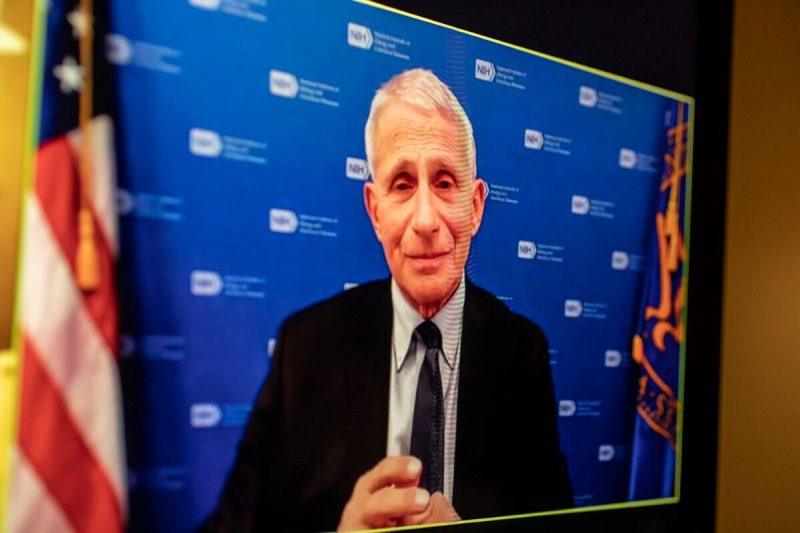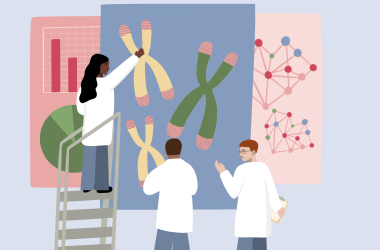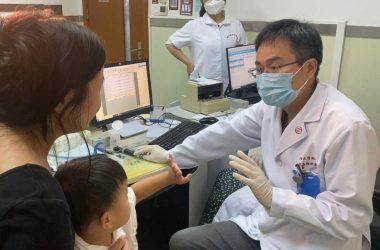It’s typical for an academic lecture to borrow from years- or decades-old data. On Friday, Anthony Fauci, the nation’s most prominent pandemic expert, offered Harvard students and faculty something much more immediate.
“What do we know, as of literally yesterday?” Fauci said. “First of all, it appears that Omicron has a transmission advantage over Delta. We’re seeing that clearly in South Africa, when if you look at early November, something very unusual happens at the end of November, beginning of December, which is an almost vertical spike in the number of new cases, which, when sequenced, were almost all Omicron.”
Fauci, director of the National Institute of Allergy and Infectious Diseases and chief medical adviser to President Biden, delivered an overview of the Omicron variant, saying that recent data suggests that it spreads more easily than the Delta variant, which has dominated the pandemic landscape since summer. Delta is reported to have a doubling time of between 11 days and two weeks, he said, compared with every three days for Omicron. It’s likely only a matter of time, he added, before the new variant dominates U.S. cases.
The good news, he said, is that evidence is building that Omicron infections are less severe. South Africa and the UK are seeing fewer hospitalizations for the same number of cases, shorter hospital stays, and less need for supplemental oxygen. Data from the UK, Fauci said, is “very strongly suggestive of less severity compared to Delta.”
Still, the risk of breakthrough infections — reinfections or infections among the vaccinated — seems to be about three times higher with Omicron than with Delta. Lab tests show a significant decrease in vaccine-derived antibodies’ ability to control Omicron, Fauci said. Within a month of a booster shot, however, antibody protection had significantly improved. Those results, he added, were key in the federal government’s decision to expand booster guidelines to include younger people.
“We feel you’re going to get reasonably good protection with a third-dose boost with Omicron,” Fauci said.
The physician and researcher was delivering the 173rd Cutter Lecture on Preventive Medicine, an annual event sponsored by the Harvard T.H. Chan School of Public Health’s Department of Epidemiology. He was introduced by Albert Hofman, chair of the department and the Stephen B. Kay Family Professor of Public Health and Clinical Epidemiology.
Fauci reviewed important findings since early 2020, a period that has seen more than 270 million coronavirus cases globally and more than 5 million deaths, a figure he said is likely a “gross underestimate.” The U.S. has been one of the world’s hardest-hit nations, with 50 million cases and nearly 800,000 deaths.
The virus is tough to control, Fauci said, because a third of those infected have no symptoms and 60 percent of infections come from someone symptom-free. Vaccines — whose rapid development Fauci termed “truly unprecedented” — have saved countless lives, with the unvaccinated facing nearly nine times the risk of testing positive, 11 times the risk of hospitalization, and 14 times the risk of dying compared with the vaccinated.
Though the world eradicated smallpox, and the U.S. and other nations have stamped out diseases like polio, measles, and yellow fever inside their borders, neither goal seems realistic for COVID, Fauci said. The near-term goal should be to reduce infections and deaths enough that ordinary life can resume, he said.
“Elimination [from the U.S.] is aspirational — it could occur but I doubt it. Then there’s control and that’s really the question that we’re facing. At what level of control are we going to be able to get back to some degree of normality? One thing for sure is that 115,000 cases a day and over 1,000 deaths is not an acceptable level of control.”
Fauci said that vaccination has been key in eliminating other diseases from the U.S. and still has the potential for a larger impact on COVID. The primary challenge, as it has been since shots were first approved, is that some 60 million Americans refused to be vaccinated. Rates must be increased, he said, even if it takes vaccination requirements by government, private industry, and other institutions.
Fauci said the U.S. has a moral obligation to also improve vaccination rates globally, but should also act out of “enlightened self-interest.” Fighting the pandemic in other nations helps blunt the threat of variants like Omicron.
“We have to do better with vaccines,” Fauci said. “But also we’ve got to be able to implement other mitigation methods. Importantly, we’ve got to vaccinate the rest of the world, particularly lower and middle income countries, because until we have a truly global response to this global pandemic, we will not be able to control it a global manner.”





